Best Education Articles of 2022: Our 22 Most Shared Stories About Students & Schools
Amid a fourth school year disrupted by COVID, our 22 most discussed articles about learning loss, student safety, innovation, mental health & more
By Steve Snyder | December 21, 2022Every December at The 74, we take a moment to recap and spotlight our most read, shared and debated education articles of the year. Looking back now at our time capsules from December 2020 and December 2021, one can chart the rolling impact of the pandemic on America’s students, families and school communities. Two years ago, we were just beginning to process the true cost of emergency classroom closures across the country and the depth of students’ unfinished learning. Last year, as we looked back in the shadow of Omicron, a growing sense of urgency to get kids caught up was colliding with bureaucratic and logistical challenges in figuring out how to rapidly convert federal relief funds into meaningful, scalable student assistance.
This year’s list, publishing amid new calls for mask mandates and yet another spike in hospitalizations, powerfully frames our surreal new normal: mounting concerns about historic test score declines; intensifying political divides that would challenge school systems even if there weren’t simultaneous health, staffing and learning crises to manage; broader economic stresses that are making it harder to manage school systems; and a sustained push by many educators and families to embrace innovations and out-of-the-box thinking to help kids accelerate their learning by any means necessary.
Now, 2½ years into one of the most turbulent periods in the history of American education, these were our 22 most discussed articles of 2022:
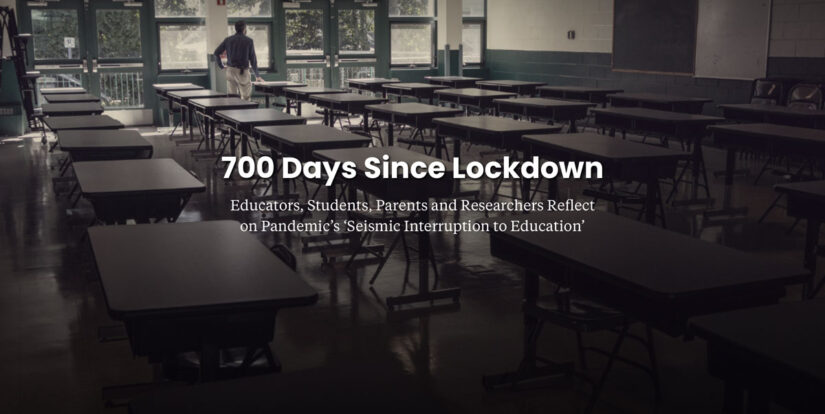
The COVID School Years: 700 Days Since Lockdown
Learning Loss: 700 days. As we reported Feb. 14, that’s how long it had been since more than half the nation’s schools crossed into the pandemic era. On March 16, 2020, districts in 27 states, encompassing almost 80,000 schools, closed their doors for the first long educational lockdown. Since then, schools have reopened, closed and reopened again. The effects have been immediate — students lost parents, teachers mourned fallen colleagues — and hopelessly abstract as educators weighed “pandemic learning loss,” the sometimes crude measure of COVID’s impact on students’ academic performance.
With spring approaching, there were reasons to be hopeful. More children had been vaccinated. Mask mandates were ending. But even if the pandemic recedes and a “new normal” emerges, there are clear signs that the issues surfaced during this period will linger. COVID heightened inequities that have long been baked into the American educational system. The social contract between parents and schools has frayed. And teachers are burning out. To mark a third spring of educational disruption, Linda Jacobson interviewed educators, parents, students and researchers who spoke movingly, often unsparingly, about what Marguerite Roza, director of Georgetown University’s Edunomics Lab, called “a seismic interruption to education unlike anything we’ve ever seen.” Read her full report.
Related:
- A 700-Day Parental Awakening: Marguerite Roza, of Georgetown’s Edunomics Lab, reflects on the past years
- 700 Days of Missed Opportunities — and Lingering Inequities: Robin Lake, of the Center on Reinventing Public Education, looks back (and forwards)
- 700 Days of Balancing Student Safety Against Keeping Classrooms Open: Superintendent Pedro Martinez reflects
- 700 Days in Pictures: 24 months inside one resilient school district
- The COVID School Years: See our special report, looking back on 700 days of the pandemic
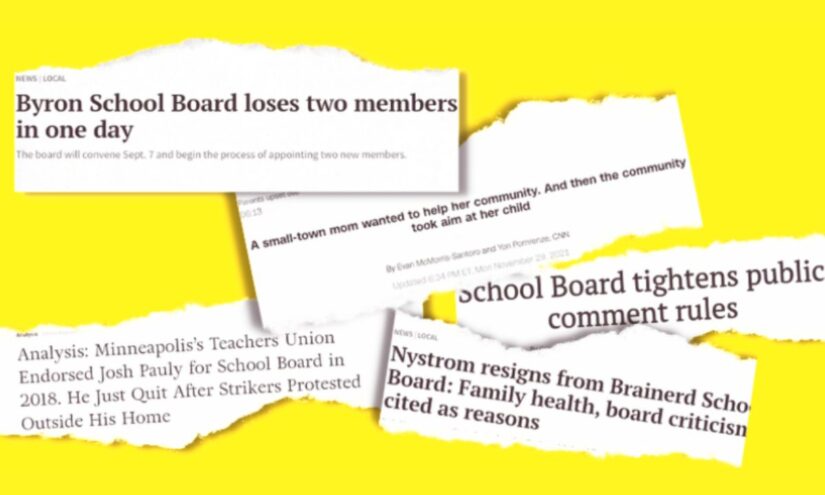
Threatened & Trolled, School Board Members Quit in Record Numbers
School Leadership: By the time we published this report in May, the chaos and violence at big city school board meetings had dominated headlines for months, as protesters, spurred by ideological interest groups and social media campaigns, railed about race, gender and a host of other hot-button issues. But what does it look like when the boardroom is located in a small community, where the elected officials under fire often have lifelong ties to the people doing the shouting? Over the last 18 months, Minnesota K-12 districts have seen a record number of board members resign before the end of their term. As one said in a tearful explanation to her constituents, “The hate is just too much.” Beth Hawkins takes a look at the possible ramifications.
Related:
- Million-Dollar Records Request: From COVID and critical race theory to teachers’ names & schools, districts flooded with freedom of information document demands
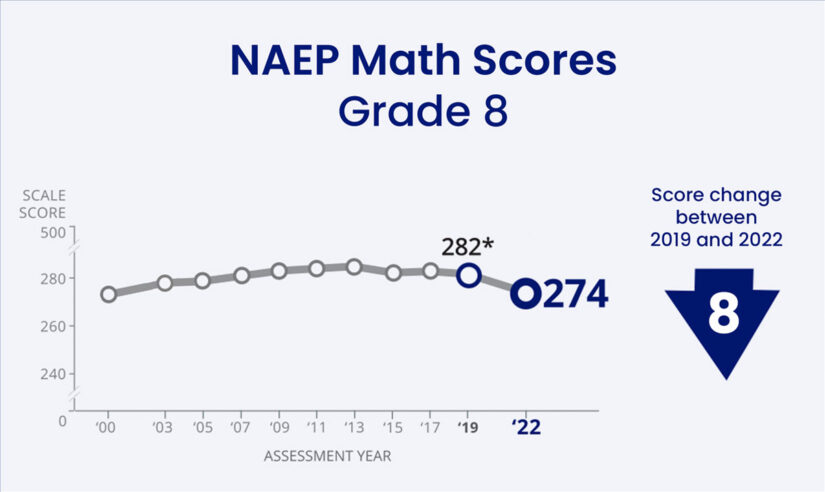
Nation’s Report Card Shows Largest Drops Ever Recorded in 4th and 8th Grade Math
Student Achievement: In a moment the education world had anxiously awaited, the latest round of scores from the National Assessment of Educational Progress were released in October — and the news was harsh. Math scores saw the largest drops in the history of the exam, while reading performance also fell in a majority of states. National Center for Education Statistics Commissioner Peggy Carr said the “decline that we’re seeing in the math data is stark. It is troubling. It is significant.” Even as some state-level data has shown evidence of a rebound this year, federal officials warned COVID-19’s lost learning won’t be easily restored. The 74’s Kevin Mahnken breaks down the results.
Related:
- Lost Decades: ‘Nation’s Report Card’ shows 20 years of growth wiped out by two years of pandemic
- Economic Toll: Damage from NAEP math losses could total nearly $1 trillion
- COVID Recovery: Can districts rise to the challenge of new NAEP results? Outlook’s not so good
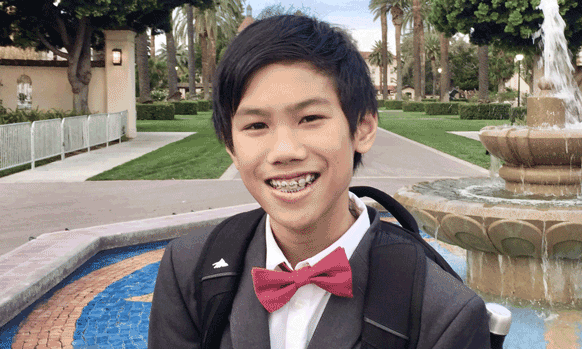
Virtual Nightmare: One Student’s Journey Through the Pandemic
Mental Health: As the debate over the lingering effects of school closures continues, the term “pandemic recovery” can often lose its meaning. For Jason Finuliar, a California teen whose Bay Area school district was among those shuttered the longest, the journey has been painful and slow. Once a happy, high-achieving student, he descended into academic failure and a depression so severe that he spent 10 days in a residential mental health facility. “I felt so worthless,” he said. It’s taking compassionate counselors, professional help and parents determined to save their son for Jason to regain hope for the future. Linda Jacobson reports.
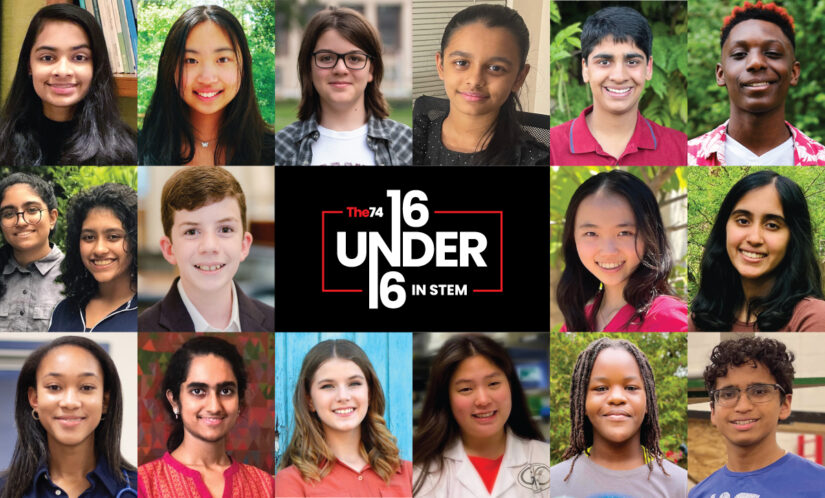
16 Under 16: Meet The 74’s 2022 Class of STEM Achievers
This spring, we asked for the country’s help identifying some of the most impressive students, age 16 or younger, who have shown extraordinary achievement in the fields of science, technology, engineering and mathematics. After an extensive and comprehensive selection process, we’re thrilled to introduce this year’s class of 16 Under 16 in STEM. The honorees range in age from 12 to 16, specialize in fields from medicine to agriculture to invention and represent the country from coast to coast. We hope these incredible youngsters can inspire others — and offer reassurance that our future can be in pretty good hands. Emmeline Zhao offers a closeup of the 2022 class of 16 Under 16 in STEM — click here to read and watch more about them.
A ‘National Teacher Shortage’? New Research Reveals Vastly Different Realities Between States & Regions
School Staffing: Adding to efforts to understand America’s teacher shortages, a new report and website maps the K-12 teaching vacancy data. Nationally, an estimated 36,504 full-time teacher positions are unfilled, with shortages currently localized in nine states. “There are substantial vacant teacher positions in the United States. And for some states, this is much higher than for other states. … It’s just a question of how severe it is,” said author Tuan Nguyen. Marianna McMurdock reports on America’s uneven crisis.
Meet the Gatekeepers of Students’ Private Lives
School Surveillance: Megan Waskiewicz used to sit at the top of the bleachers and hide her face behind the glow of a laptop monitor. While watching one of her five children play basketball on the court below, the Pittsburgh mother didn’t want other parents in the crowd to know she was also looking at child porn. Waskiewicz worked on contract as a content moderator for Gaggle, a surveillance company that monitors the online behaviors of some 5 million students across the U.S. on their school-issued Google and Microsoft accounts in an effort to prevent youth violence and self-harm. As a result, kids’ deepest secrets — like nude selfies and suicide notes — regularly flashed onto Waskiewicz’s screen. Waskiewicz and other former moderators at Gaggle believe the company helped protect kids, but they also surfaced significant questions about its efficacy, employment practices and effect on students’ civil rights. Eight former moderators shared their experiences at Gaggle with The 74, describing insufficient safeguards to protect students’ sensitive data, a work culture that prioritized speed over quality, scheduling issues that sent them scrambling to get hours and frequent exposure to explicit content that left some traumatized. Read the latest investigation by The 74’s Mark Keierleber.
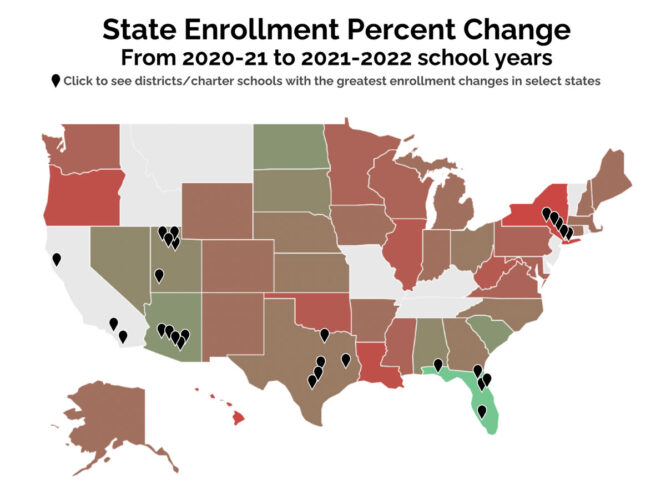
Students Continue to Flee Urban Districts as Boom Towns, Virtual Schools Thrive
Exclusive Data: A year after the nation’s schools experienced a historic decline in enrollment, data shows many urban districts are still losing students, and those that rebounded this year typically haven’t returned to pre-pandemic levels. Of 40 states and the District of Columbia, few have seen more than a 1% increase compared with 2020-21, when some states experienced declines as high as 5%, according to data from Burbio, a company that tracks COVID-related education trends. Flat enrollment this year “means those kids did not come back,” said Thomas Dee, an education professor at Stanford University. While many urban districts were already losing students before the pandemic, COVID “accelerated” movement into outlying areas and to states with stronger job markets. Experts say that means many districts will have to make some tough decisions in the coming years. Linda Jacobson reports.
‘Hybrid’ Homeschooling Making Inroads as Families Seek New Models
School Choice: As public school enrollments dip to historic lows, researchers are beginning to track families to hybrid homeschooling arrangements that meet in person a few days per week and send students home for the rest of the time. More formal than learning pods or microschools, many still rely on parents for varying levels of instruction and grading. About 60% to 70% are private, according to a new research center on hybrid schools based at Kennesaw State University, northwest of Atlanta. Greg Toppo reports.
Educators’ ‘Careless’ Child Abuse Reports Devastate Thousands of NYC Families
Student Safety: Thousands of times every year, New York City school staff report what they fear may be child abuse or neglect to a state hotline. But the vast majority of the resulting investigations yield no evidence of maltreatment while plunging the families, most of them Black, Hispanic and low income, into fear and lasting trauma. Teachers are at the heart of the problem: From August 2019 to January 2022, two-thirds of their allegations were false alarms, data obtained by The 74 show. “Teachers, out of fear that they’re going to get in trouble, will report even if they’re just like, ‘Well, it could be abuse.’ … It also could be 10 million other things,” one Bronx teacher said. Read Asher Lehrer-Small’s report.
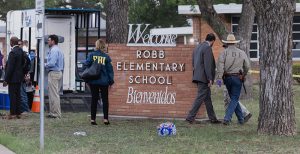
The Contagion Effect: From Buffalo to Uvalde, 16 Mass Shootings in Just 10 Days
Gun Violence: May’s mass school shooting in Texas — the deadliest campus attack in about a decade — has refocused attention on the frequency of such devastating carnage on American victims. The tragedy unfolded just 10 days after a mass shooting at a supermarket in Buffalo, New York. It could be more than a coincidence: A growing body of research suggests these assaults have a tendency to spread like a viral disease. In fact, The U.S. has experienced 16 mass shootings with at least four victims in just 10 days. Read Mark Keierleber’s report.
Teachers Leaving Jobs During Pandemic Find ‘Fertile’ Ground in New School Models
Microschools: Feeling that she could no longer effectively meet children’s needs in a traditional school, former counselor Heather Long is among those who left district jobs this year to teach in an alternative model — a microschool based in her New Hampshire home. “For the first time in their lives, they have options,” Jennifer Carolan of Reach Capital, an investment firm supporting online programs and ed tech ventures, told reporter Linda Jacobson. Some experts wonder if microschools are sustainable, but others say the ground is “fertile.” Read our full report.
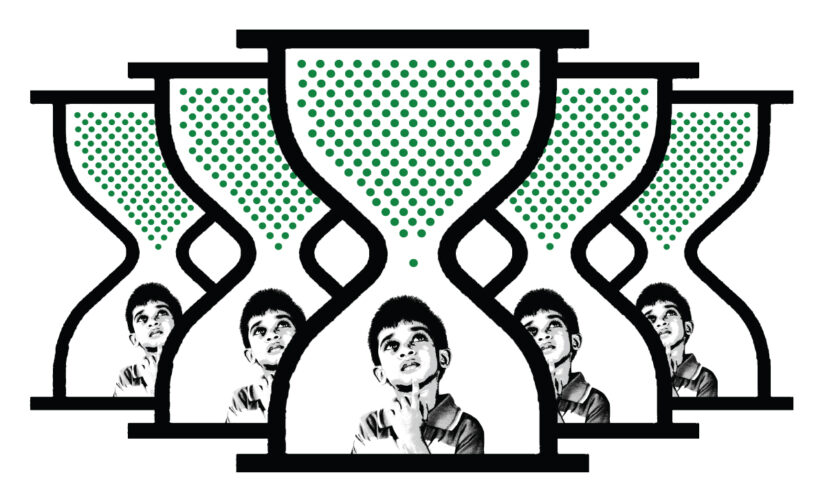
Facing Pandemic Learning Crisis, Districts Spend Relief Funds at a Snail’s Pace
School Funding: Schools that were closed the longest due to COVID have spent just a fraction of the billions in federal relief funds targeted to students who suffered the most academically, according to an analysis by The 74. The delay is significant, experts say, because research points to a direct correlation between the closures and lost learning. Of the 25 largest districts, the 12 that were in remote learning for at least half the 2020-21 school year have spent on average roughly 15% of their American Rescue Plan funds — and districts are increasing pressure on the Education Department for more time. Linda Jacobson reports.

Slave Money Paved the Streets. Now, This Posh Rhode Island City Strives to Teach Its Past
Teaching History: Every year, millions of tourists marvel at Newport, Rhode Island’s colonial architecture, savor lobster rolls on the wharf and gaze at waters that — many don’t realize — launched more slave trading voyages than anywhere else in North America. But after years of invisibility, that obscured chapter is becoming better known, partly because the Ocean State passed a law in 2021 requiring schools to teach Rhode Island’s “African Heritage History.” Amid recent headlines that the state’s capital city is now moving forward with a $10 million reparations program, read Asher Lehrer-Small’s examination of how Newport is looking to empower schools to confront the city’s difficult past.
Harvard Economist Thomas Kane on Learning Loss, and Why Many Schools Aren’t Prepared to Combat It
74 Interview: This spring, Harvard economist Thomas Kane co-authored one of the biggest — and most pessimistic — studies yet of COVID learning loss, revealing that school closures massively set back achievement for low-income students. The effects appear so large that, by his estimates, many schools will need to spend 100% of their COVID relief to counteract them. Perversely, though, many in the education world don’t realize that yet. “Once that sinks in,” he said, “I think people will realize that more aggressive action is necessary.” Read Kevin Mahnken’s full interview.
In White, Wealthy Douglas County, Colorado, a Conservative School Board Majority Fires the Superintendent, and Fierce Backlash Ensues
Politics: The 2021 election of four conservative members to Colorado’s Douglas County school board led to the firing in February of schools Superintendent Corey Wise, who had served the district in various capacities for 26 years. The decision, which came at a meeting where public comment was barred, swiftly mobilized teachers, students and community members in opposition. Wise’s ouster came one day after a 1,500-employee sickout forced the shutdown of the state’s third-largest school district . A few days later, students walked out of school en masse, followed by litigation and talk of a school board recall effort. The battle mirrors those being fought in numerous districts throughout the country, with conservative parents, newly organized during the pandemic, championing one agenda and more moderate and liberal parent groups beginning to rise up to counter those views. Jo Napolitano reports.
Weaving Stronger School Communities: Nebraska’s Teacher of the Year Challenges Her Rural Community to Wrestle With the World
Inspiring: Residents of tiny Taylor, Nebraska, call Megan Helberg a “returner” — one of the few kids to grow up in the town of 190 residents, leave to attend college in the big city and then return as an adult to rejoin this rural community in the Sandhills. Honored as the state’s 2020 Teacher of the Year, Helberg says she sees her role as going well beyond classroom lessons and academics. She teaches her students to value their deep roots in this close-knit circle. She advocates on behalf of her school — the same school she attended as a child — which is always threatened with closure due to small class sizes. She has also launched travel clubs through her schools, which Helberg says has strengthened her community by breaking students, parents and other community members out of their comfort zone and helping them gain a better view of the world outside Nebraska while also seeing their friends and neighbors in a whole new light. This past winter, as part of a broader two-month series on educators weaving community, a team from The 74 made multiple visits to Taylor to meet Helberg and see her in action with her students. Watch the full documentary by Jim Fields, and read our full story about Helberg’s background and inspiration by Laura Fay.

Other profiles from this year’s Weaver series:
- Texas’s Alejandro Salazar: The band teacher who kept his school community connected through COVID’s chaos
- Hawaii’s Heidi Maxie: How an island teacher builds community bridges through her Hawaii school
- Georgia’s Allie Reeser: Living and learning among refugees in the ‘Ellis Island of the South’
- See the full series: Meet 12 educators strengthening school communities amid the pandemic

Research: Babies Born During COVID Talk Less with Caregivers, Slower to Develop Critical Language Skills
Big Picture: Independent studies by Brown University and a national nonprofit focused on early language development found infants born during the pandemic produced significantly fewer vocalizations and had less verbal back-and-forth with their caretakers compared with those born before COVID. Both used the nonprofit LENA’s “talk pedometer” technology, which delivers detailed information on what children hear throughout the day, including the number of words spoken near the child and the child’s own language-related vocalizations. It also counts child-adult interactions, called “conversational turns,” which are critical to language acquisition. The joint finding is the latest troubling evidence of developmental delays discovered when comparing babies born before and after COVID. “I’m worried about how we set things up going forward such that our early childhood teachers and early childhood interventionalists are prepared for what is potentially a set of children who maybe aren’t performing as we expect them to,” Brown’s Sean Deoni tells The 74’s Jo Napolitano. Read our full report.
Minneapolis Teacher Strike Lasted 3 Weeks. The Fallout Will Be Felt for Years
Two days after Minneapolis teachers ended their first strike in 50 years this past May, Superintendent Ed Graff walked out of a school board meeting, ostensibly because a student protester had used profanity. The next morning, he resigned. The swearing might have been the last straw, but the kit-bag of problems left unresolved by the district’s agreement with the striking unions is backbreaking indeed. Four-fifths of the district’s federal pandemic aid is now committed to staving off layoffs and giving classroom assistants and teachers bonuses and raises, leaving little for academic recovery at a moment when the percentage of disadvantaged students performing at grade level has dipped into the single digits. From potential school closures and misinformation about how much money the district actually has to layoffs of Black teachers, a lack of diversity in the workforce and how to make up for lost instructional time, Beth Hawkins reports on the aftermath.
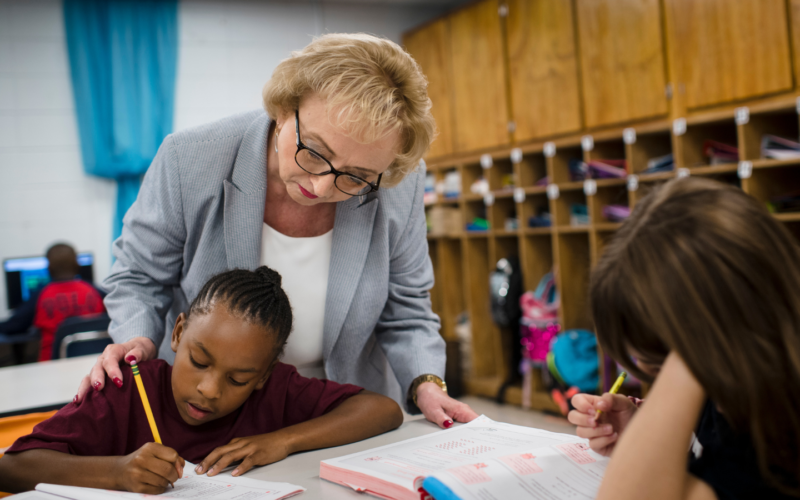
After Steering Mississippi’s Unlikely Learning Miracle, Carey Wright Steps Down
Profile: Mississippi, one of America’s poorest and least educated states, emerged in 2019 as a fast-rising exemplar in math and reading growth. The transformation of the state’s long-derided school system came about through intense work — in the classroom and the statehouse — to raise learning standards, overhaul reading instruction and reinvent professional development. And with longtime State Superintendent Carey Wright retiring at the end of June, The 74’s Kevin Mahnken looked at what comes next.
As Schools Push for More Tutoring, New Research Points to Its Effectiveness — and the Challenge of Scaling it to Combat Learning Loss
Learning Acceleration: In the two years that COVID-19 has upended schooling for millions of families, experts and education leaders have increasingly touted one tool as a means for coping with learning loss: personalized tutors. In February, just days after the secretary of education declared that every struggling student should receive 90 minutes of tutoring each week, a newly released study offers more evidence of the strategy’s potential — and perhaps its limitations. An online tutoring pilot launched last spring did yield modest, if positive, learning benefits for the hundreds of middle schoolers who participated. But those gains were considerably smaller than the impressive results from some previous studies, perhaps because of the project’s design: It relied on lightly trained volunteers, rather than professional educators, and held its sessions online instead of in person. “There is a tradeoff in navigating the current climate where what is possible might not be scalable,” the study’s co-author, Matthew Kraft, told The 74’s Kevin Mahnken. “So instead of just saying, ‘Come hell or high water, I’m going to build a huge tutoring program,’ we might be better off starting off with a small program and building it over time.” Read our full report.
Florida Teen Invents World’s First Sustainable Electric Vehicle Motor
STEM: Robert Sansone was born to invent. His STEM creations range from springy leg extensions for sprinting to a go-kart that can reach speeds of 70 mph. But his latest project aims to solve a global problem: the unsustainability of electric car motors that use rare earth materials that are nonrenewable, expensive and pollute the environment during the mining and refining process. In Video Director James Field’s video profile, the Florida high schooler talks about his creation, inspiration and what he plans to do with his $75,000 prize from the 2022 Regeneron International Science and Engineering Fair. Learn more right here, and watch our full portrait below:
Get stories like these delivered straight to your inbox. Sign up for The 74 Newsletter

